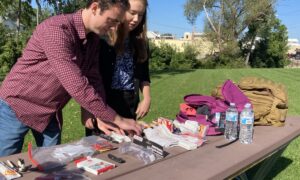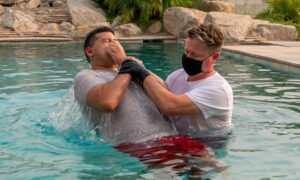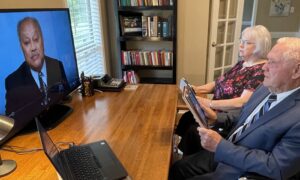IT BEGAN while I was visiting my elderly parents and uncle in Jacksonville, Florida. This was shortly before my uncle died a few months ago. As usual, we went to the Kingdom Hall of Jehovah’s Witnesses on Sunday morning to attend a public talk. We heard a fine discourse, “Will You Be a Survivor of the ‘Last Days’?” On the way home, my uncle said: “That talk reminded me of when I survived a terrible disaster.” He paused a moment, then added: “You know, I survived the sinking of the Titanic.”
Later I asked my uncle, Louis Garrett, to tell me about his experience on the Titanic.
“Let me go back to the beginning,” he said. “I was born in 1900, in Hakoor, Lebanon, a small mountain village about 80 to 90 miles (130 to 140 km) north of Beirut. My family owned and operated a water-powered stone mill that ground wheat into flour. My father was the village miller. It was decided that the family would migrate to the United States. In 1904 my mother and my two sisters left Lebanon. Later, in 1906, my older brother left for the United States. It was in 1912, to complete the family migration, that my father, my sister and I were to leave for the United States.
“In March 1912, we sailed to Marseilles, France. While there, we booked passage on the Titanic to sail on its maiden voyage to New York. The date of its sailing was April 10, 1912. My father had to be left behind in Marseilles because he could not pass the required physical examination due to an eye infection.” My uncle smiled and exclaimed: “A very fortunate turn of events for him!”
“My sister was 14 years old,” he continued, “and I was 12 when we boarded the Titanic. We were saddened to leave my father behind, but were excited about being on board the R.M.S. Titanic, the largest, fastest and most luxurious ship of its time—and also said to be unsinkable! There were over 2,200 people on board, including some of the wealthiest and most influential people of that time. Many were on the Titanic to celebrate its maiden voyage. It was the “in” thing to do for the socially prominent. The ship’s speed was as expected. The anticipated arrival in New York was to be Wednesday, April 17. The water was calm, the weather typically chilly for April.
“On Sunday, April 14, our fifth day at sea, the weather turned exceptionally cold—so bitterly cold that not many people were out on the promenade deck. We heard that there were warnings of icebergs in the area. None were expected to be sighted on the ship’s course, so the Titanic maintained full speed ahead. However, the captain of the Californian, another ship in the North Atlantic, radioed a warning to the Titanic about icebergs being sighted in our path. This was ignored. The price paid for overconfidence on the part of Captain Smith, nearly 700 fellow crewmen and over 800 passengers, was indeed very high.
“At approximately 11:45 p.m. Sunday, April 14, my sister and I were awakened with a jolt. She was in the upper berth of the cabin and screamed, ‘Something’s wrong!’
“‘Go back to sleep,’ I called to her. ‘You worry too much.’ Soon an elderly man, whom we had met on board and who took a fatherly interest in us, came to our cabin and said calmly: ‘Come out of your cabin and go to the upper deck. Don’t bother about taking your belongings for now. You’ll get them later.’
“We had steerage-class tickets, meaning we could go up to the second-class deck. But those on second-class and steerage could not pass through a guarded gate that led to the first-class upper deck. However, we were told it would be wise to get to the first-class upper deck in order to have a better chance of getting into a lifeboat. The only way this could be done was to climb an iron ladder from the steerage deck below up five or six decks to the lifeboats above. This we did with much difficulty, for it was hard for my sister to climb the iron ladder. But with help from others we made it.
“What a sight! Most of the lifeboats were gone. The crew was permitting women and children only to board the lifeboats—there were not enough for everyone. We saw women crying, not wanting to leave their husbands; husbands begging their wives and children to hurry and get into the lifeboats. Amid this complete pandemonium and mass hysteria stood my sister and I, two immigrant children, unable to speak English, frightened beyond belief, crying and looking for help.
“The last lifeboat was being loaded. A middle-aged gentleman was with his very young, pregnant wife. He helped her into the lifeboat, then looked back to the deck and saw others wanting to get aboard. He kissed his wife good-bye, and, returning to the deck, grabbed the first person in his path. Fortunately, I was there in the right place at the right time and he put me into the lifeboat. I screamed for my sister who had frozen from fright. With the help of others, she also was pushed into the lifeboat. Who was the gallant man who performed this kind act? We were told he was John Jacob Astor IV. At that time he was 45 years old and his wife, Madeleine, was 19. They were traveling to the United States because they wanted their child to be born there. Many newspaper stories were written that told how John Jacob Astor gave up his life for a young immigrant. The Astor family records indicate that, according to Mrs. Astor, Mr. Astor had words with a crewman who tried to prevent him from helping his wife into the lifeboat. He did so anyway. And, as I said, he kissed her and, returning to the deck, began helping others into the lifeboat.
“I was happy to be in the lifeboat, but I still had a feeling of sorrow for the ones left on the Titanic. Looking back at that big, beautiful ship, I could see it from a different perspective and, with some of the lights still on, I could see the size and beauty of the ship. In the stillness of the night and with sound traveling so well over water, we could hear the band playing on deck and people singing ‘Nearer My God to Thee.’ The crew rowed away from the ship as far as they could. There were fears that a suction would develop when it made its final plunge into the ocean depths. That did not happen, nor was there an explosion as some thought there would be. The waters were unusually calm that night and it was a good thing, for most of the lifeboats were loaded down with people.
“The Titanic sank about 2:20 a.m. April 15, 1912, according to the records. I saw it slide down into the ocean to its horrible finish. The moment it sank left a memory of something that haunts me till this day. It was the eerie sound of the people groaning and screaming frantically for help, as they were hurtled into the icy water. Almost all died from the cold water. The sounds lasted for about 45 minutes and then faded away.”
My uncle was quiet for a while, remembering. He then continued: “An SOS had been sent out about midnight. It was received by the S.S. Carpathia of the Cunard White Star Line. It was about 58 miles (93 km) away and immediately turned around from its course, which was heading for Gibraltar, and proceeded full steam ahead to the rescue. It arrived at about 4:30 a.m. Interestingly, the S.S. Californian was only 20 miles (32 km) away from the spot where the Titanic sank, but the radio operator did not pick up the SOS signal because he was off duty. Later reports showed that the Californian did see flares in the night, but thought the passengers on the Titanic were shooting fireworks in celebration of the maiden voyage.
“The Carpathia completed the rescue operations about 8:30 a.m. Our lifeboat was among the last to be rescued. After being taken aboard, bundled up, given hot tea and made comfortable, I was happy to be alive, even though I had a coat and shoes much too large.
“Later the captain of the Carpathia called all the survivors to come on deck and see the iceberg. My 12-year-old mind recorded it as being as high as a two-story house, much wider and with a huge chimney. The ship delivered us to New York before continuing its trip to Gibraltar, a very kind act on the part of the management of the Cunard White Star Line. We arrived in New York at 8:30 p.m., Thursday, April 18, and were taken to the Cunard White Star docks.
“Looking back at those long hours in the lifeboat, it now seems miraculous that we reached the safety of the Carpathia. The bitter cold was almost unbearable. We huddled together to keep warm. People were kind to one another. I remember how windy it was there on the deck of the Carpathia. The winds had picked up to several knots per hour. Fortunately the winds held off just long enough for the rescue mission. Had the waters not remained calm and smooth during that time, it is doubtful that the rescue operations would have been so successful.”
“Did any in the lifeboats die?” I asked.
“I only know of one person in our lifeboat who died from the cold. The body was wrapped in a sheet and slipped overboard.”
“Were there any men in your lifeboat?”
“Only women and children, as ordered by the crew, with the exception of a few crew members who served as oarsmen. There was one young couple with a baby who ‘put one over’ on the crew. The wife was very shrewd; she dressed her young husband as a woman, covered his head with a shawl and gave him the baby. He was in one lifeboat and she was in ours. Both were rescued by the Carpathia.
“On our arrival in New York, we expected to be taken to Ellis Island to clear immigration procedures. However, this was waived because of the pain and suffering already endured by the survivors. We were turned over to the Red Cross to be united with our families. My older brother, Isaac, was in New York and our meeting was mixed with joy and sadness. My father was still in France. However, we concluded that had he been on the Titanic with us, he would not have survived because of the women-and-children-only rule. Maybe even our being survivors would have been affected. We would have found it hard to leave Dad on board the Titanic and be seeking our own safety. Fortunately for him, he arrived safely three months later on another ship.”
My uncle paused, lost in thoughts of that terrible ordeal. Finally, I broke in on his reverie. “You survived that tragedy. Now, when did you learn of this impending tribulation of the ‘last days’?”
“Let me take you from 1912 to 1930,” he said. “A colporteur from Brooklyn, New York, had visited Jacksonville, Florida, where my older brother’s family and my family, consisting of my wife, my son and I, resided. My older brother had been studying the Bible with some of Jehovah’s Witnesses who spoke Arabic. He had become an active Witness himself. The colporteur, named George Kafoory, held several meetings for Arabic-speaking people. I received a copy of the book The Harp of God in Arabic. After many debates with my brother, I got so upset that I finally told him, ‘I disown you as a brother because you have left your original Greek Orthodox religion. I can’t believe that you’ll never make the sign of the cross, the symbol of the Trinity, again.’
“I loved my brother and I was deeply disturbed by this rift between us. Months later, I happened to come across that copy of The Harp of God that I had obtained. It had gathered dust, but I opened it and started reading in the early afternoon, continuing beyond midnight. The truth of God’s Word began making inroads on my heart. I joined a study being conducted for Arabic-speaking persons and was baptized in 1933.
“One more event in my life stands out. It was in 1949 that I was financially able to make a trip I had dreamed of for many years. In Lebanon, I had an older half brother with whom I wanted to visit and share the Kingdom hope. On the flight back to Lebanon, our route took us over Greenland and also very nearly over the spot where the Titanic sank. I was overcome by my emotions while looking down on the cold Atlantic waters and reflecting on that sad occasion.
“A stewardess, noticing the tears streaming down my face, leaned over quietly, patted my arm and asked: ‘Is there anything wrong? May I help?’ I responded: ‘No, I was just thinking of when I was a young lad 12 years old. I was on a great ship, the Titanic that went down and lost over 1,500 lives in those very waters below. I still can’t forget that frantic morning and the cries for help that came from the darkness and those icy waters.’ ‘How sad,’ said the pretty dark-haired stewardess. ‘I remember reading about the Titanic disaster.’
“I completed the trip to Lebanon. Happily, my older half brother was interested in the Bible. Later he also became a dedicated Christian witness of Jehovah.”
My uncle Louis concluded his story with an expression of hope that the kingdom of God will replace the present satanic system of things.
“The truth of God’s Word,” he declared, “has been a guiding force in my life. I thank Jehovah for sparing my life in the Titanic disaster and that I have had the opportunity to serve him now in these critical ‘last days.”’ He lived near his older brother and his wife and together with them served Jehovah to the best of his ability to the day of his death. Never did he cease praying for God’s will to be done on earth as in heaven. (Matt. 6:9, 10) It was his strong hope that, should he die before Armageddon, God would rescue him from the power of the grave by a resurrection to life.





